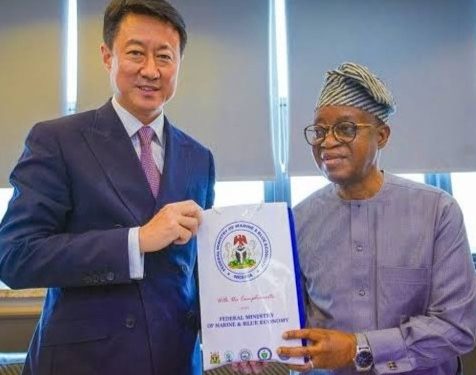- Chinese Ambassador to Nigeria, Yu Dunhai (left), and Minister of Marine and Blue Economy, Adegboyega Oyetola, during the meeting in Abuja…recently
By Anthony Nwachukwu
Nigeria and China have committed to furthering their partnership in the marine and blue economy sector by boosting port development and opening new markets for Nigerian aquaculture exports.
Reaching the understanding in Abuja with the Chinese Ambassador to Nigeria, Yu Dunhai, the Minister of Marine and Blue Economy, Adegboyega Oyetola, noted that Nigeria’s maritime domain holds immense potential for shipping, port operations, fisheries, renewable ocean energy, marine tourism and coastal infrastructure development.
They reaffirmed commitment to building on the foundation of China-Nigeria relations, with Oyetola optimistic of new avenues of collaboration from the engagement.
According to the minister, “Nigeria’s marine and blue economy holds tremendous opportunities for investors, and with China’s cooperation, we are confident of unlocking this potential for the benefit of our people.”
He highlighted Nigeria’s 853-kilometer coastline and over 10,000-kilometers inland waterways, stating that the “ministry is determined to create the right framework for investment and partnership,” adding that Nigeria has a lot to learn from China’s marine and blue economy development model.”
On his part, Ambassador Dunhai reaffirmed China’s readiness to support Nigeria in harnessing its vast marine and blue economy potential. Commending the country’s huge maritime endowment, he noted the Lekki Deep Seaport, which was constructed by China Harbour Engineering Company, as a shining example of Sino-Nigerian collaboration.
Dunhai stated that the port is capable of handling ultra-large container vessels, thereby significantly boosting Nigeria’s trade volume. He added that in this light, it has created thousands of direct and indirect jobs, eased congestion at Lagos ports, and positioned Nigeria as a key maritime hub in West and Central Africa.
According to him, an agreement is in the works for the export of Nigerian aquaculture products to China, which will open new markets for local producers and strengthen food trade ties between the two nations.
This comes as China has already approved zero tariffs on Nigeria’s aquaculture exports to its market to demonstrate its commitment to deepening economic cooperation.
Meanwhile, Nigeria and China have also signed a $2 billion maritime investment deal to accelerate indigenous vessel ownership and position Nigeria as a regional maritime hub.
The initiative is expected to deliver vessel investments, freight contracts for Nigerian operators, maritime training and training vessels, and is also expected to create over 2,000 new maritime jobs annually, train 25,000 globally certified Nigerian seafarers, and build a robust local shipping ecosystem.
































